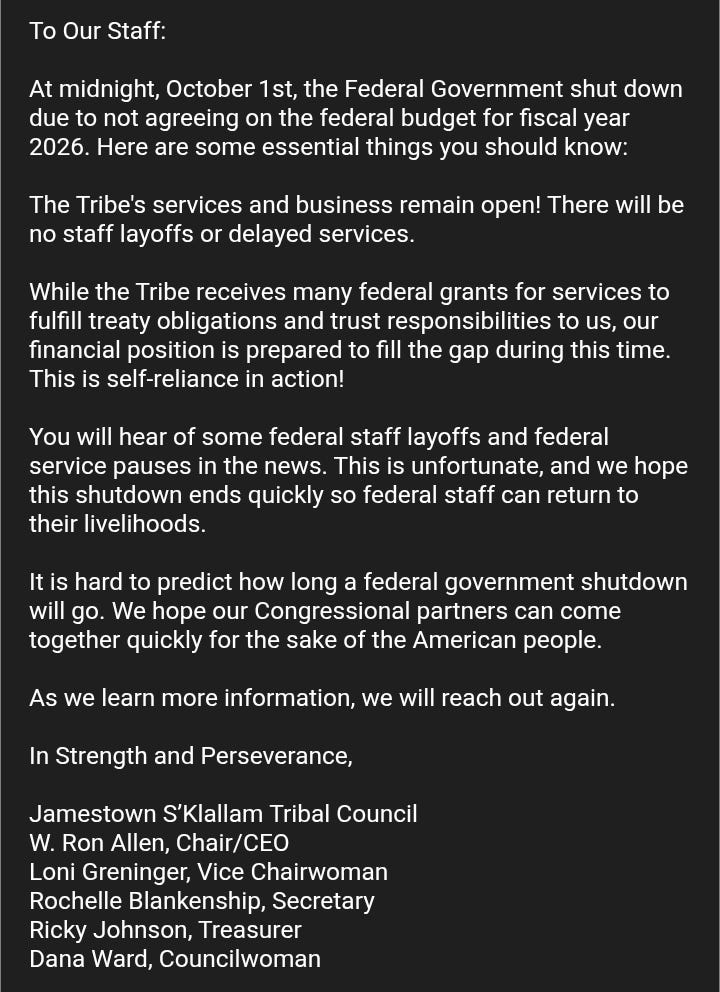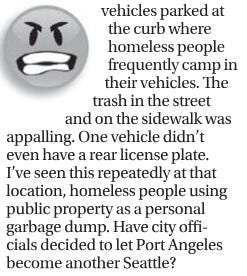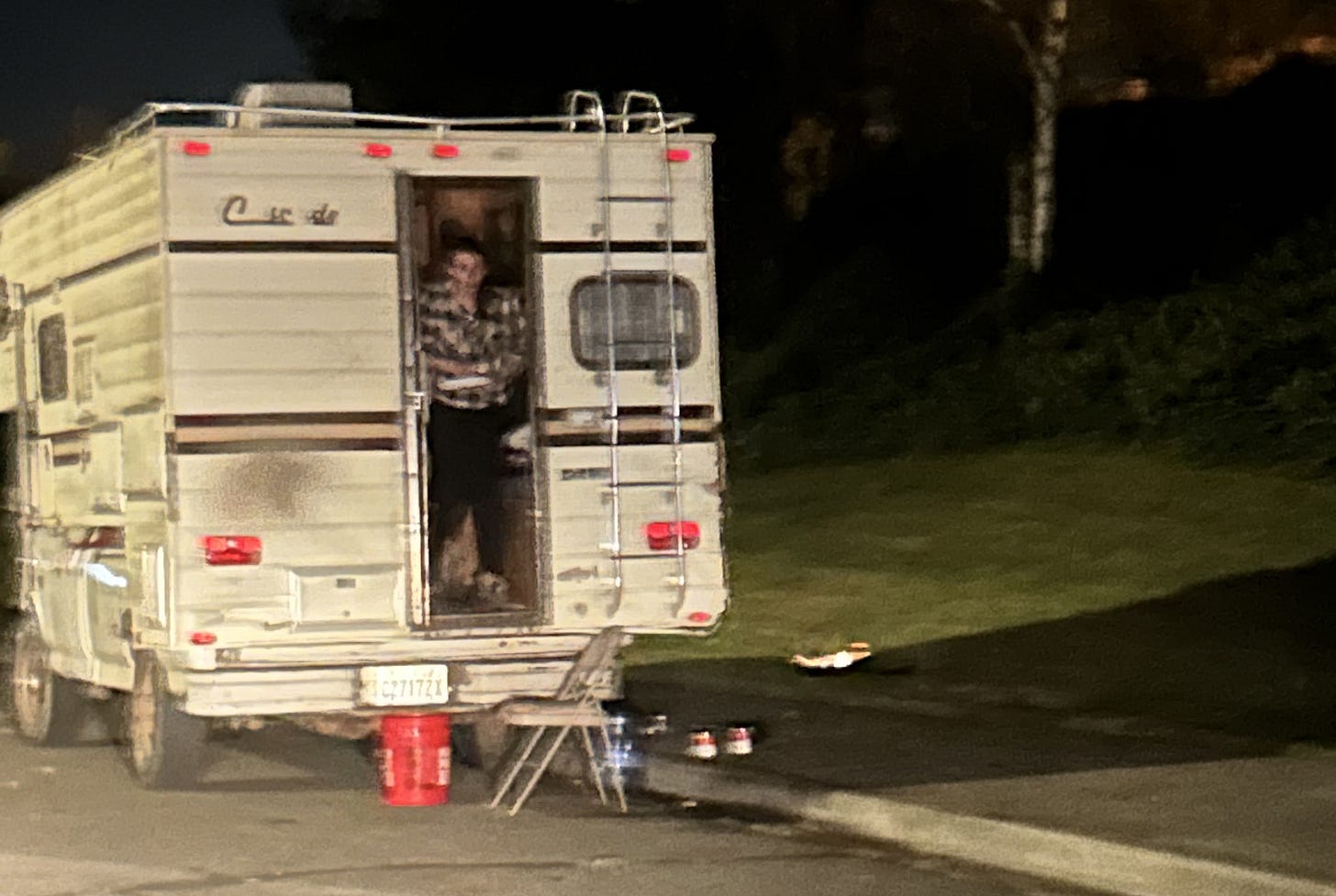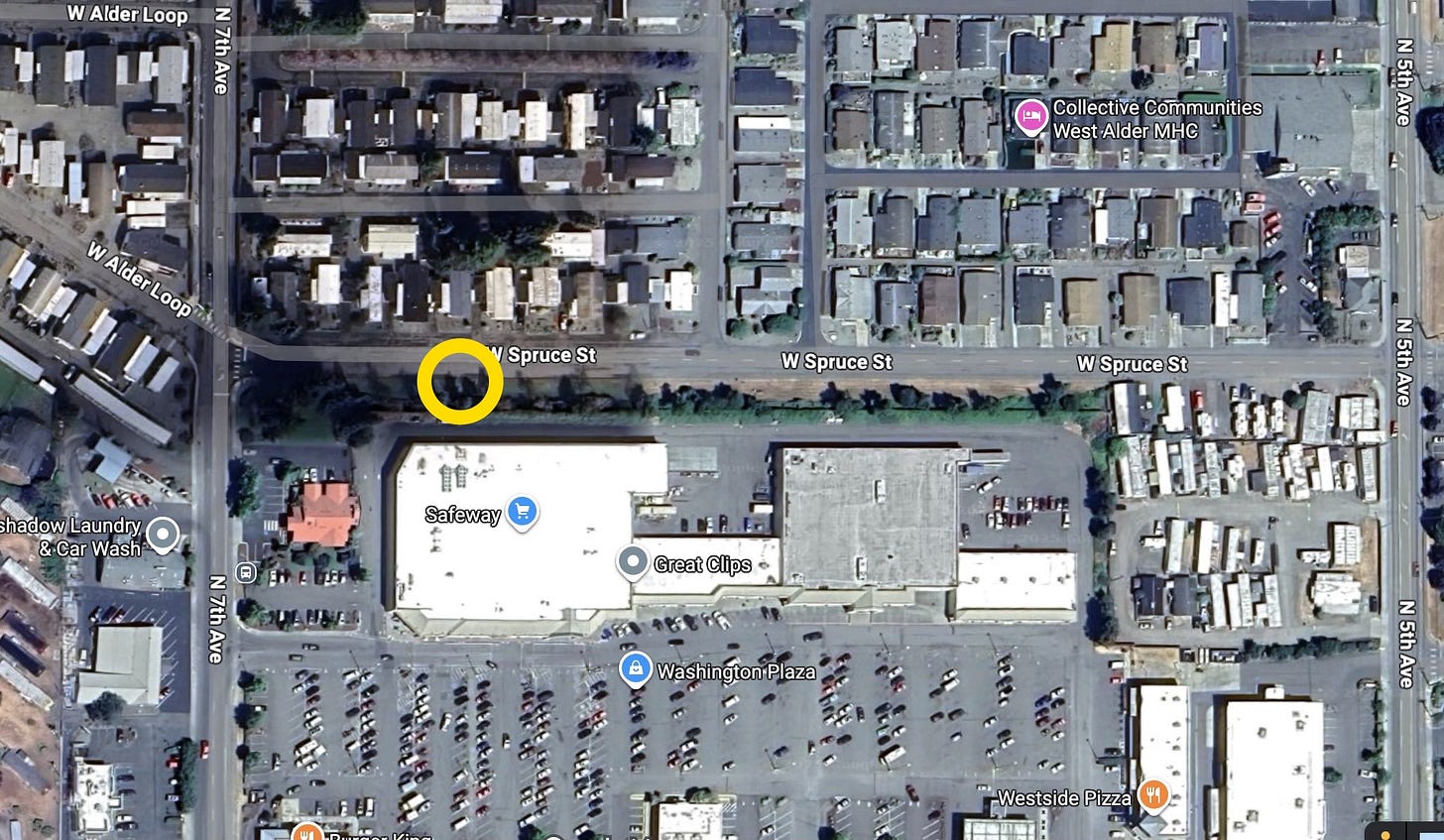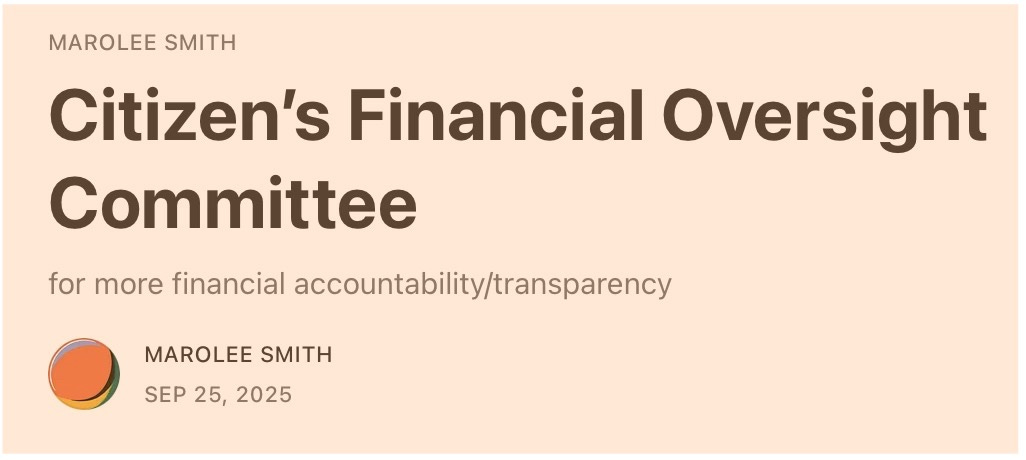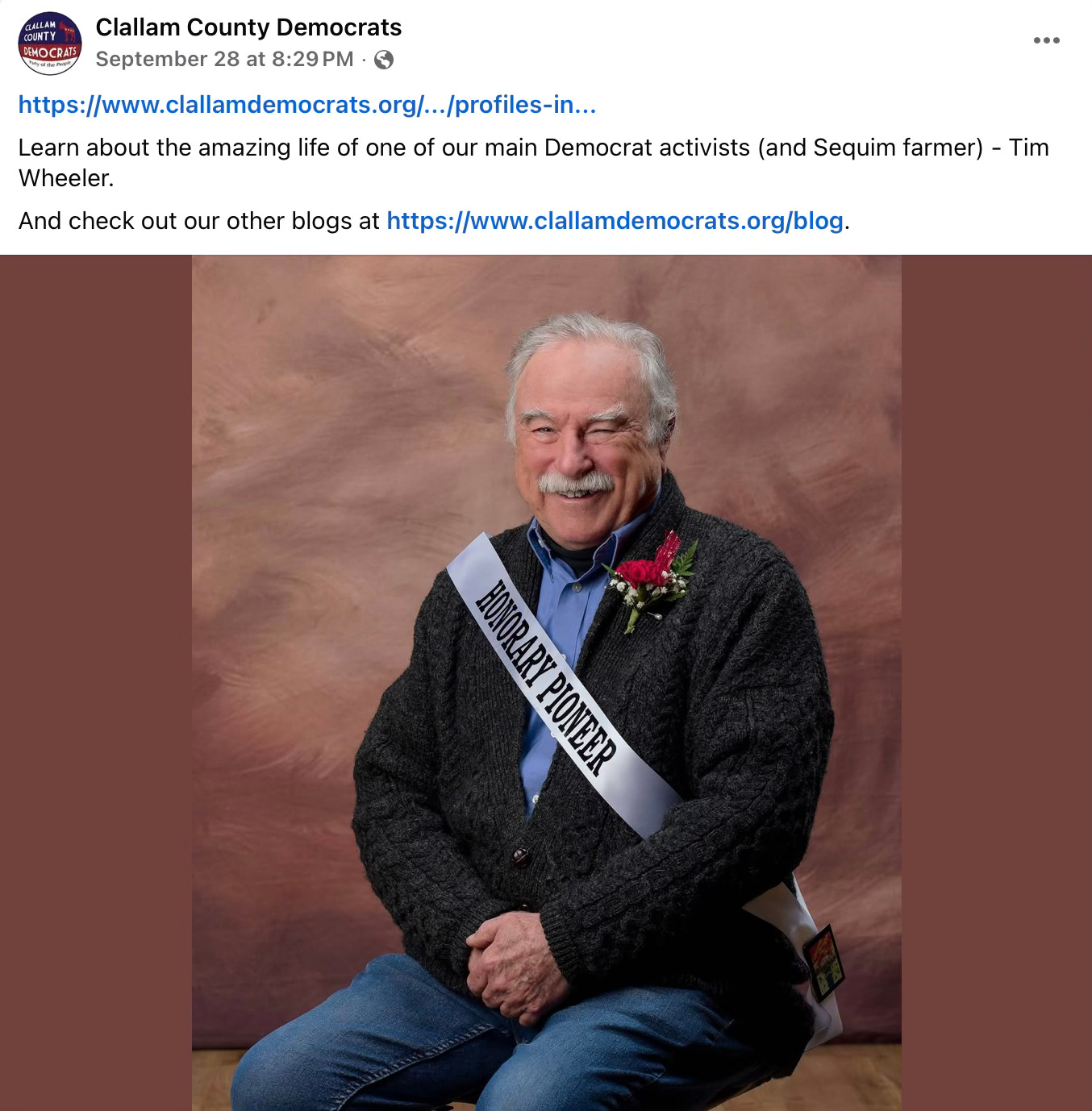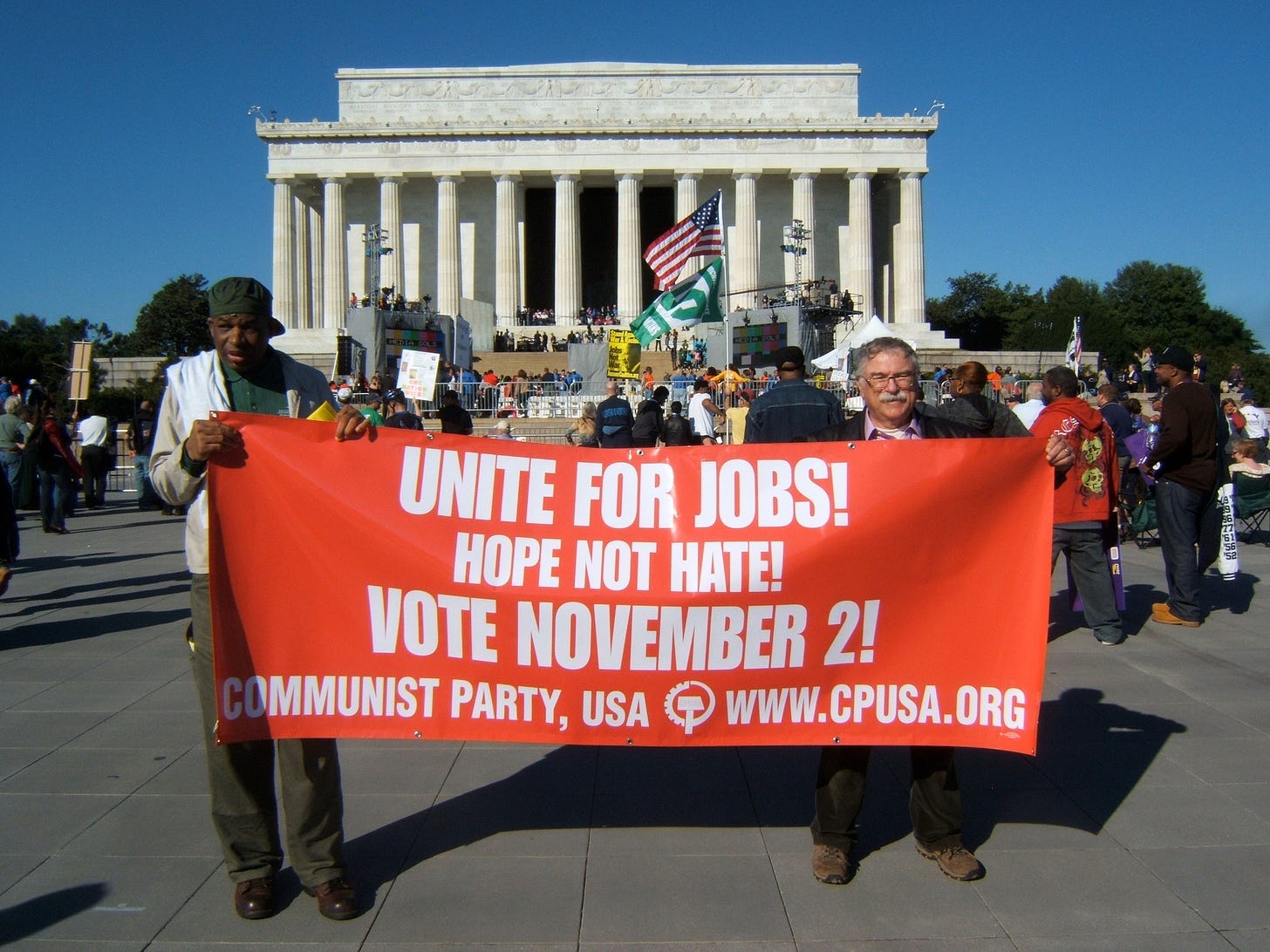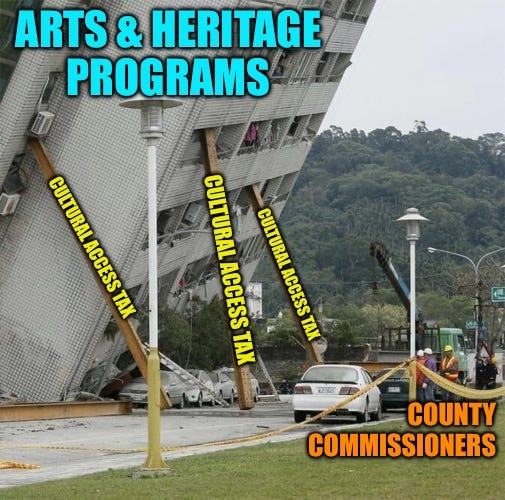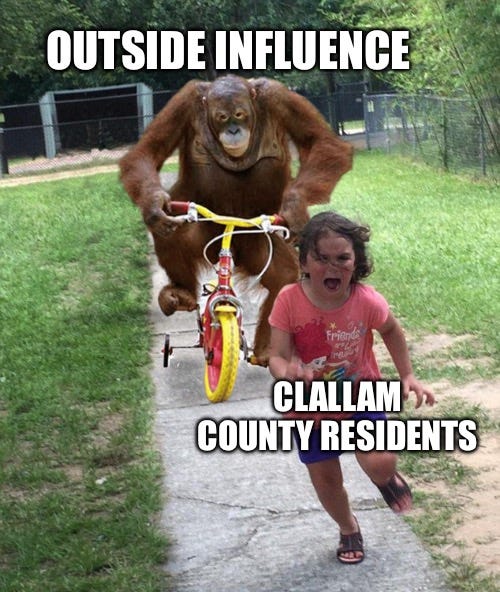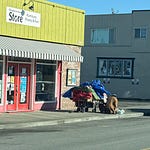Each of these stories — from the misuse of buzzwords like “self-reliance” to tone-deaf leadership and unchecked spending — points to a deeper issue: the quiet erosion of accountability. Clallam County’s struggles aren’t unique, but they’re magnified when those in power forget whom they serve. Good governance doesn’t begin in Olympia or Washington, D.C. It begins here — with residents who question, verify, and demand better. The price of bad governance is always paid locally. But the dividend of vigilance belongs to everyone.
When “self-reliance” depends on federal grants
As a result of the government shutdown, the Jamestown S’Klallam Tribe, Clallam County’s second-largest employer, recently sent an email to staff declaring that, “While the Tribe receives many federal grants for services to fulfill treaty obligations and trust responsibilities to us, our financial position is prepared to fill the gap during this time. This is self-reliance in action!”
The sentiment might sound admirable, but the statement borders on contradiction. Self-reliance isn’t typically defined by reliance on another government’s grants. It’s a reminder that words like “sovereignty” and “self-sufficiency” ring hollow when they’re funded by taxpayers.
Seattle has arrived in Port Angeles
Port Angeles residents are growing weary of a familiar urban decay creeping into their community — vehicle campers, trash-strewn sidewalks, and bikes gone missing. One reader wrote to the Peninsula Daily News asking, “Have city officials decided to let Port Angeles become another Seattle?”
Between free drug paraphernalia, free transit, free food, and free homeless luxury housing, it’s becoming harder to deny what’s happening. The city’s lenient policies have turned “harm reduction” into harm relocation — and the consequences are being felt by families, schools, and small businesses alike.
Addicts at the school gate
A recycling worker wrote to CC Watchdog after a troubling morning at Roosevelt Elementary.
I pick up recycling for the schools, and this morning I went to Roosevelt.
We usually drive through the service entrance, but the gate has been locked in the morning. Im not always on this route, so I’ve only been to Roosevelt once since summer break has ended. Its still dark when I get there and I figured they only open the gates when they fill the recycling. I decided to drive around to the main entrance to verify.
The parking lot only had one car there. A women came out that worked there and told me she’s supposed to open the gate but the last time she did, a man came out screaming at her and made her uncomfortable and she asked if I could follow her to the gate so she could open it and I did.
I’ve personally dealt with addicts threatening me in the early morning while walking my dog, but I wanted to tell you this story because the problem has gotten to the point where addicts or people with mental issues are coming onto schools and making the staff uncomfortable.
It’s a small story with big implications. When addiction and mental illness spill onto school property, the problem stops being theoretical. “Harm reduction” sounds compassionate — until the harm starts reaching your children’s classrooms.
ORCAA’s priorities go up in smoke
The Olympic Regional Clean Air Agency (ORCAA), where Commissioner Mike French sits on the board, wants Clallam County to require free burn permits for residential yard waste. Commissioner French says it’s about “educating the public” to prevent wildfires. That message might carry more weight if the agency’s members weren’t ignoring the fires burning behind Sequim’s Safeway, where derelict RVs have set up camp — complete with campfires — in the greenbelt.
Before regulating backyard gardeners, perhaps the focus should be on enforcing the laws we already have.
Buying silence on the Dungeness
In the Dungeness Valley, the Jamestown S’Klallam Tribe and several farmers have partnered on a “dry year leasing” program that pays landowners not to irrigate. The idea is to leave more water in the river for salmon during drought years — a program now bankrolled by Amazon and the Washington Department of Ecology.
But let’s call it what it is: taxpayers and corporations paying farmers not to grow food while an exempt corporation irrigates its golf course. In a region where “water is wealth,” the tribe’s growing influence over water rights raises uncomfortable questions. How long before partnership gives way to dominance — and independence becomes something that can be bought and sold?
No opposition? Think again.
When the City of Port Angeles applied to transfer Elwha River forestlands from state trust to City management, its 2023 application claimed there was “no known opposition.” This was under Mayor Kate Dexter.
Less than a year later, the McKinley Paper Mill closed, wiping out nearly 200 local jobs. Economist Dan Underwood ran through the sobering numbers in July of last year:
The estimated employment income of the 193 direct jobs at McKinley Paper Mill totaled $16 million
Another 151 supply-chain positions depend on the mill, adding more than $11 million in labor income
When that money circulated through the local economy, it generated an additional $3.2 million and supported roughly 73 more jobs.
The direct tax hit to Clallam County and the City of Port Angeles was around $300,000. Add another $500,000 in supply-chain-related losses, plus $320,000 from the broader economic slowdown. The region faced about $1.1 million in lost annual tax revenue
The total loss to the county was estimated to be 418 jobs and more than $31 million in annual income. Yet city leaders who dismissed the timber industry as expendable feigned surprise at the fallout. Dexter is up for re-election — and voters should remember who called this “no opposition.”
A case for fiscal oversight
Entrepreneur and city council candidate Marolee Smith Dvorak is running against Mayor Kate Dexter and calling attention to the city’s staggering $156.7 million budget — and asking why no one seems to understand it.
“How many of our elected officials have ever managed a budget of that size?” she asks. “Do their eyes just glaze over?”
Her solution, outlined on her own Substack, is simple: establish a citizens’ finance committee to provide independent oversight, ensure transparency, and end the habit of rubber-stamping staff requests. In an era of growing debt, hidden liabilities, and “creative accounting,” Dvorak’s proposal sounds less like politics and more like common sense.
Clallam Democrats honor a communist
You can tell a lot about an organization by who it celebrates. The Clallam County Democrats recently spotlighted activist and farmer Tim Wheeler as a “main Democrat activist.”
What their Facebook post left out is that Wheeler is a longtime member of the Communist Party USA.
Perhaps the local party sees this as ancient history, but it’s fair to ask: if the goal is to win trust from moderate voters, why elevate a figure whose ideology is fundamentally opposed to the democratic values they claim to uphold?
Taxing the helpers
A new statewide sales tax expansion — the largest in Washington’s history — now taxes nonprofit services that were once exempt. From advertising to auctioneers, charities must pay up to 10% on fundraising essentials.
At one food bank, the director put it bluntly: “That’s food directly taken from our clients to cover these taxes.” It’s a self-inflicted wound, punishing the very nonprofits doing the government’s work. The same dynamic applies in Clallam County, where rising costs and endless levies make it harder for good people to help those in need.
The lighter side of local politics
For those needing a laugh between meetings and mandates, look no further than Jennifer R’s Substack — a witty mix of memes and commentary that often echoes CC Watchdog themes and is delivered right to your inbox.
Describing herself as a “Rural GenX housewife and bad government survivor,” she manages to turn dysfunction into humor.
In a county where frustration often outweighs optimism, her posts are a reminder that laughter can still be a form of civic resilience.



